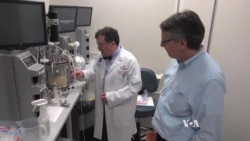As bad as things are for people in conflict zones of the Middle East and North Africa, a U.S. health expert says things could get much worse. The breakdown in health infrastructure could open the way to catastrophic epidemics.
Dr. Peter Hotez, who directs vaccine development at the Baylor College of Medicine and Texas Children’s Hospital in Houston and serves as a U.S. science envoy, is working on a plan to fight such epidemics before they happen.
“For once, could the world be proactive in thinking about these diseases, rather than slowly reacting to a crisis?” he asked.
Hotez cited last year’s Ebola outbreak in West Africa as an example of the world reacting to contain the disease only after it became a crisis. He said there had been some progress in developing vaccines for Ebola, but no clinical trials occurred until after thousands of people had died of the disease.
Hotez is developing a plan to establish vaccine-producing laboratories, much like the one he operates in Houston, in Saudi Arabia, Qatar and Morocco, all of which he said fit the right profile.
In each country, he said, "there is already a stable government, there’s a certain level of sophistication in terms of the ability to make biotechnology products, and there is the political will and economic horsepower to make it happen.”
These countries could then identify potential outbreaks and get vaccines to refugees and others near the areas controlled by groups like Islamic State, where health workers dare not go.
Hotez said an epidemic could start with infected people coming out of an ISIS-controlled zone infecting others.
“The diseases that emerge out of those ISIS-occupied areas are eventually going to affect and destabilize the entire Middle East and North African region," he said.
With help from the U.S. State Department, Hotez has traveled to Morocco, and he said officials there recognize the health threats from disrupted nations to the east as well as the recent Ebola epidemic area to the south.
The Ebola outbreak, Hotez said, showed the need for public financing of vaccine development and production.
“The Ebola crisis really highlighted what happens when you have a disease for which the vaccine technology is available, but you have a market failure because there was no incentive for the big pharmaceutical companies to get involved," he said.
Hotez said he plans to visit Saudi Arabia and Qatar in the coming months to discuss his epidemic-prevention project with officials there.











